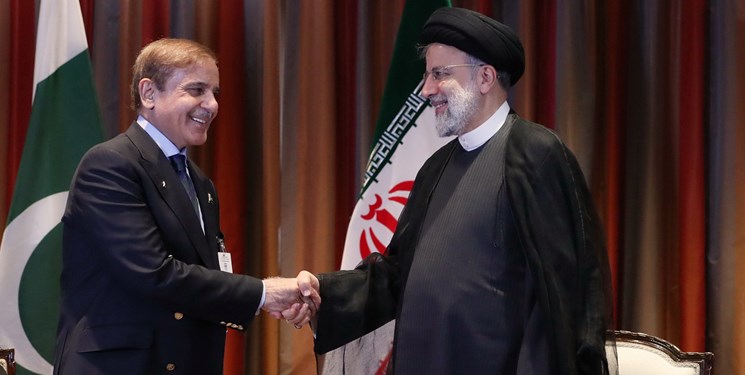
Iranian President Ebrahim Raisi meets with Pakistani Prime Minister Shehbaz Sharif on the sidelines of the United Nations General Assembly, 20 September 2022.
“He expressed hope that Islamic countries will…form a united and coherent front.”
While certain pillars of Iranian foreign policy, such as rejection of Israel’s right to exist and opposition to the United States remain immutable, over the past two decades, Iran has undertaken diplomatic rapprochement on several fronts. Relations between Iran and Russia, for example, are at their closest in 50 years.[i] The March 2023 announcement that Iran and Saudi Arabia would resume diplomatic ties breaks down an important barrier between Iran and the Arab world. As the accompanying article from the Iranian Fars News Agency relays, Iranian President Ebrahim Raisi’s call for greater strategic cooperation between Iran and Pakistan reflects Iran’s continued efforts for rapprochement with traditional rivals.
Raisi’s outreach to Pakistan comes on the heels of exacerbated tensions between Iran and Pakistan over Afghanistan: Iran backed many Shiite Hazara groups and western Afghanistan’s ethnic Persians, while Pakistan supported Sunni and Pashtun warlords culminating in its embrace of the Taliban. In the wake of the Taliban takeover of Afghanistan, however, Iran sought a new approach. It cooperated with Pakistan to operate border markets on both sides of the Iran-Afghanistan and Iran-Pakistan frontiers. Iran also decided to engage the Taliban diplomatically rather than stonewall them or fight them by proxy.[ii]
Iran’s effort to build better relations with Pakistan also takes place amidst rumors of U.S. efforts to broker a rapprochement between Israel and Pakistan. The Iranian government would look at any such development as a security threat, much as it considers Azerbaijan’s ties with Israel a threat to its security. Any Iran-Pakistan rapprochement would also directly augment China’s position. Pakistan’s indebtedness to China as a result of the China-Pakistan Economic Corridor (CPEC) has increased Beijing’s influence in Islamabad. China’s efforts to broker Iran-Saudi rapprochement demonstrate Tehran’s growing openness to China as well. While Raisi might pitch animosity toward Israel as the basis for growing ties, a position that would have populist appeal among Pakistanis, commonalities regarding China may be as important.
Source:
“Raisi dar Goftegu ba Nakohost Vazir-e Pakistan: Keshavarha-ye Islami ba Tashkil Junbeh-e Vahid Mana’ Tadavem Aghdamat-e Dadamenshaneh Siyonistha Shavand (Raisi, in a Conversation with the Prime Minister of Pakistan: Islamic Countries Should Form a United Front to Prevent the Continuation of the Abusive Actions of the Zionists),” Fars News Agency (news agency closely affiliated with the Islamic Revolutionary Guard Corps), 13 April 2023. https://www.farsnews.ir/news/14020124000742
In a telephone call with Pakistani Prime Minister Shehbaz Sharif, Ayatollah Sayyid Ibrahim Raisi expressed deep concern over recent developments in Palestine. He condemned the Zionist regime’s crimes, especially the indignity that the Al-Aqsa Mosque suffered, and expressed hope that Islamic countries will prevent the continuation of the Zionists’ brutal actions by forming a united and coherent front.
Later in the telephone conversation, the president pointed to the longstanding and friendly relations between the two countries, and expressed hope that these relations, especially in the field of economic and energy, will expand even further. He said that the policy of strengthening relations with neighbors and developing relations with Islamic countries is one of the priorities of the 13th [Raisi] government….… Shehbaz Sharif also emphasized his country’s interest in strengthening Tehran-Islamabad relations, pointing to Iran’s privileged position in the region and the importance of expanding Islamabad’s relations with Tehran. He stressed his government’s readiness not only to review economic cooperation projects, but also Pakistan’s willingness to implement them.
Notes:
[i] Michael Rubin, “Iran-Russia Relations” OE Watch, July 2016. https://community.apan.org/wg/tradoc-g2/fmso/m/oe-watch-past-issues/195435
[ii] Michael Rubin, “An Afghan Perspective: New Phase in Afghanistan-Iran Relations” OE Watch, July 2020. https://community.apan.org/wg/tradoc-g2/fmso/m/oe-watch-past-issues/340009 and Michael Rubin, “Iran Talking to the Taliban,” OE Watch, June 2020. https://community.apan.org/wg/tradoc-g2/fmso/m/oe-watch-past-issues/336632
Image Information:
Image: Iranian President Ebrahim Raisi meets with Pakistani Prime Minister Shehbaz Sharif on the sidelines of the United Nations General Assembly, 20 September 2022.
Source: https://media.farsnews.ir/Uploaded/Files/Images/1401/06/29/14010629000909_Test_PhotoN.jpg
Attribution: Fars News Agency
